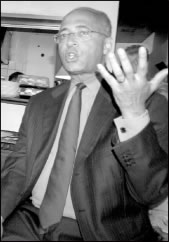By Albert Amateau
Comptroller William Thompson told a coalition of preservation advocates last week about his views on balancing preservation and development. But Thompson, a Democratic candidate for mayor, also responded to questions that covered a broad range of potential campaign issues.
Thompson told the Aug. 12 preservation forum that the city, which is expected to add 1 million more people by 2030, needs development. Nevertheless, he warned that careless and haphazard construction has proven dangerous.
“How do you explain the delay in demolishing the Deutsche Bank building at the World Trade Center?” was one of the questions that came up at the forum, sponsored by New York Landmarks Conservancy, the Historic Districts Council, Greenwich Village Society for Historic Preservation, Landmark West and Municipal Art Society.
“I don’t think you can explain it,” Thompson replied. “It’s one thing in Lower Manhattan that the city administration is responsible for and they’ve dropped the ball again and again. It’s inexcusable. A continuous failure of oversight — of safety,” he added.
Another question: “What changes would make education better for our children?”
“I support mayoral control but the system focuses on standardized tests too much,” Thompson responded. “The tests cannot have the only role in judging achievement. Children are being taught to spit out answers. It’s about doing well on standard tests, not about comprehension,” he said.
Another question prompted Thompson to remark that the target of most complaints about city agencies is the Department of Buildings.
“No matter what the borough, people complain about the Department of Buildings,” he said. “The department needs professional people, especially for inspecting construction sites,” he added.
A resident of W. Ninth St. wanted to know if Thompson would have intervened in the Landmarks Preservation Commission procedure that recently approved a modified St. Vincent’s Hospital-Rudin residential project in the Village.
“I know that people felt they were being stonewalled,” Thompson replied. “There should be a process that’s open and fair, not just the city saying, ‘This is what we want to do,’ and then finding a way to do it,” he went on. Nevertheless, Thompson said he “would not want to jump in and manipulate the process.”
Regarding development, in general, Thompson told the forum, “We need thoughtful planning and smart growth. We need building in the interest of people, not just profits. We need to take into account the needs of people and neighborhoods.
“Urban planning is more than finding ways to accommodate developers,” he said. “We should decide what we want a neighborhood to look like first.”
Regarding large projects, Thompson said, “I’m not in favor of picking one developer and giving him a lot to do. There are advantages to multiple developers on a large project.”
The Landmarks Preservation Commission should have adequate funding — “the tools and teeth” — it needs to do its job, Thompson said. He noted that even before a potential landmark is calendared for a hearing, a developer who doesn’t want landmark designation could rush to demolish a building. “By the time the hearing is scheduled, the building is gone or the things that make it historical are destroyed,” he said. The city should make sure the Landmarks Commission should have better connections with other relevant agencies, like the Departments of Buildings and City Planning, he said.
Thompson agreed that the L.P.C. ought to pay equal attention to preservation in all neighborhoods, including Harlem and Queens, not just the most populated or glamorous.
Community boards should be getting more resources instead of having their budgets cut, he added.
“They are a reliable source of information about our neighborhoods, and we should have as many people as possible involved — and trained to participate,” he said.
Waterfront access and open space for public recreation should be part of the balance of private-public development, he said.
“We have to be able to develop public open space and waterfront parks and find ways to pay for them,” he said.
Thompson promised to look into one questioner’s charge that many public-housing apartments are warehoused, in effect, by being kept vacant for renovations that never seem happen.
Regarding the balance of preservation and development, Henry Stern, former New York City Parks commissioner, asked, “Do you think the entire city should be a historic district?” Thompson’s short answer was “No.”
Under his breath Stern replied, “Sometimes you wonder,” apparently referring to the aggressive preservation position of the groups that sponsored the forum.
The forum sponsors issued a “2009 Citywide Preservation Platform,” whose first plank calls for encouraging reusing and rehabilitating older buildings, including city buildings acquired by default.
The platform, signed onto by more than 100 organizations citywide, also calls for expanding state and city tax-credit programs for landmarked properties. A task force to study feasible ways to preserve and support the maintenance of historic religious properties is also in the platform.
The preservation agenda additionally calls for more staffing and funding for the Landmarks Preservation Commission, better communication to ensure that commissioners are aware of pending landmark requests, and a protocol for working with the Department of Buildings in emergency situations involving landmarks.





































